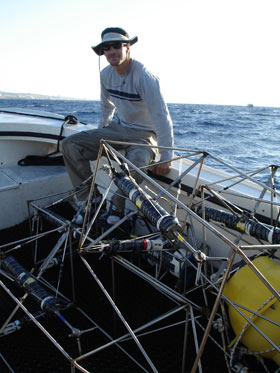The AMS/UCAR Congressional Science Fellowship is a unique opportunity for scientists to become involved in the policy process on Capitol Hill. On Tuesday, the current AMS fellow and two former fellows gathered to discuss some of their experiences and dispense advice to potential applicants.
The 2009-10 AMS Congressional Fellow is Jonah Steinbuck, who received his Ph.D. in environmental fluid mechanics and hydrology from Stanford University in 2009. Steinbuck describes his work as a fellow for Representative Edward Markey (D-MA) in the Select Committee for Energy Independence and Global Warming as an “incredible experience.”
Steinbuck noted that he chose working with Markey and the Select Committee for a number of reasons: 1) because of his interest in climate policy and his belief that the Select Committee gave him the best opportunity to pursue that interest, 2) because “Chairman Markey is one of the leaders in environmental and energy issues,” and 3) because of the Select Committee staff, which allows him to be “a sponge absorbing information” from “some of the best climate policy talent on Capitol Hill.”

Perhaps the highlight of Steinbuck’s fellowship thus far was his recent trip to the Copenhagen Summit, where he received a credential from the State Department and was able to attend the talks. Steinbuck was particularly impressed with the dramatic conclusion when President Obama negotiated the final text of the agreement with other world leaders.
While the Select Committee awaits the final results of the conference, Steinbuck is also currently tracking EPA regulation of greenhouse gases while monitoring a number of bills proposed to block such regulation from stationary sources.
Past fellows Stephanie Herring and Michael Morgan also spoke about their Congressional Fellowship experiences. Herring, who like Steinbuck served under Congressman Markey in the Select Committee for Energy Independence and Global Warming, is currently working on climate science and service issues as a climate policy analyst in the office of the Department of the Deputy Undersecretary at NOAA. During her time as a fellow, Herring worked on the original version of the legislation that eventually became the Clean Energy and Security Act (also known as the Waxman-Markey Bill). She called the fellowship an ideal transition into new pursuits and in this clip responded to a question on how her fellowship experience enhanced her Ph.D. studies.
Morgan, currently a professor at the University of Wisconsin, recalled his time in Senator Benjamin Cardin’s (D-MD) personal office with fondness, even though, as he explained here, it was the exact opposite of what he originally thought he was looking for in a fellowship experience. Morgan explained that one of the most important things he learned on Capitol Hill was that “science is not enough”–senators must consider all their legislative priorities and their constituents’ priorities and determine how science fits into that framework.
The speakers cited numerous characteristics that Congressional Fellowship applicants should have: analytic skills, interpersonal skills, awareness of federal policy, an understanding of the role and limits of science in federal policy, diplomacy and political acumen, a sense of ethics, and perhaps most importantly, a legitimate interest in policy that has been displayed in their academic career. They noted that the competition for the fellowship is considerable and that the scientific records of most applicants is outstanding.
Applications for the 2010-2011 fellowship are due by February 10.